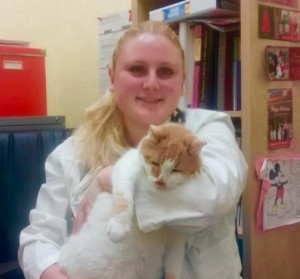What is Toxic to Cats?
Written by Dr. Tanya Ruisi
Cats are notoriously curious creatures. This can easily get them into trouble at home. Many household products are toxic and potentially deadly to our feline friends. Keeping an eye out for these common toxins can help keep your furry friend happy and healthy.
Cats are particularly sensitive to both oral and topical insecticide toxins. The most common cause for exposure is when canine products are used on cats: particularly permethrin. NEVER apply medications intended for dogs to cats. Application can cause tremors, seizures and even death. If you cat is ever exposed by accident, immediately wash off the product and bring the pet to the vet.
At home insect traps and sprays can also attract cats. Because cats groom so frequently, it is easy for them to ingest toxins from the home or yard, just by walking through them. Always keep cats away from sprays, powders, or pellets. This also applies to household cleaners. Bleach and other products can cause damage to a cats sensitive mouth or stomach, so allow all products to dry or wipe down with water after use.
Human and other animal medications can pose a threat to cats as well. Medications like antidepressants and amphetamines (ADD/ADHD medications) can cause neurological symptoms like seizures and panting. They can also cause vomiting, diarrhea, increased temperature, and fast heart rate. Keeping these medications in a safe place away from cats is important. If exposure is suspected, DO NOT WAIT, bring your pet to the vet immediately for hospitalization and monitoring.
Pain relievers, NSAIDs and acetaminophen, are common medications found in almost every household. NSAIDs, like aspirin or ibuprofen, can cause bleeding ulcers in the stomach or intestines. They can also cause kidney failure at relatively low doses. Acetaminophen: Tylenol, can cause drooling, anemia (low red blood cell count), liver failure, and death. NEVER give your pets human or other pet’s medications. Always consult a veterinarian if you suspect your pet has eaten these medications.
Household plants, particularly lilies can cause vomiting and/or diarrhea, depression, and even progress to kidney failure. Be aware before buying house plants of toxic species like the umbrella plant, lily-of-the-valley, poinsettias, etc. Check with your veterinarian if you are unsure.
We always try and protect our pets. By avoiding exposure to toxins we can keep our pets healthy. If exposure occurs it is important to contact your veterinarian IMMEDIATELY for further instruction. If you are unsure if the pet got into anything (finding pills spread on the floor), bring your cat and the medications to the veterinarian ASAP.
If you believe your pet may have been exposed to something toxic and would like help, you can call the ASPCA Animal Poison Control or contact us at 813-991-9898 or if it’s after hours, call us at 813-991-9244.


